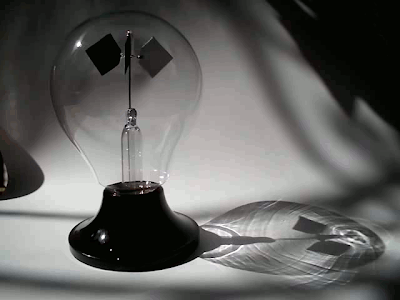The point of science models is to get a better handle on how things work in the natural world, and to make predictions.
The point of mathematics is to ease our way through the models.
Still, when we reduce things to their most basic levels in class, when the intuitive clashes with the natural world, the intutitive wins almost every single time.
***
A little background, if you're so inclined, otherwise jump to the balloon below.
Most of my AP lambs can blast their way through the ideal gas law, and so can most of you:
PV=nRT
P is the pressure of gas
V is the volume of the gas
n is the amount of gas molecules--it is a finite number
T is the temperature, or how fast the gas molecules, on average, are moving
R is the ideal gas constant, which we will ignore for now
Pressure is one of those concepts everybody thinks they get, partly because it is so easily manipulated mathematically:
P=F/A
P is the pressure
F is force, or push
A is the amount of area being pushed by the force
The more push on a given area, the more pressure. The more area for a given push, less pressure.
***
I spent a good chunk of my morning drilling a hole into a one gallon jug. (I wore safety glasses, though maybe a mask would have been smart, too--glass dust can't be good...)
I put a balloon into the jug, then blow it up--I can feel air rush out the tiny hole in the side of the bottle as I do this.
After I blow up the balloon, I seal the hole, and this is what I get:
You are looking into the inside of an inflated balloon.
***
The conceptual model is this--if a gas molecule hits you or anything else, it gives a tiny force related to its velocity and the angle it hits you. If it helps you to think of tiny demons driving bumper cars, fine, as long as you know that these demons cannot steer their cars, and that their cars never stop moving relative to other cars, because, well, they're gas molecules, and that's what gas molecules do.
(Yes, I know I am committing mortal sin among science teachers here, but I want to make a pedagogical point, not a science one.)
Most of my students see my balloon bottle as a parlor trick--and fail to see the science behind it.
I remind them of the ideal gas law equation, then ask then to predict what will happen to the balloon if I warm up the bottle. Most have been trained to think the balloon will get bigger, but of course it does not. The demons in the bottle drive faster, bang against the balloon more often, and the balloon shrinks.
I ask them if air molecules are moving, and most say well, yeah, air is rushing in the bottle, which is, I suppose, half true.
I hold a candle to the open mouth--the flame does not flicker. No net flow of air. If air molecules are bouncing in, well, they must be bouncing out, too.
What would happen if I take my balloon in a bottle up to outer space? I can't test that one easily, but we can reason it out--the balloon will flip and inflate outside the bottle.
***
And so, science teacher, what is the point of this winded post?
Here it is--some of my "lowest" students, the ones who will never see the letters "AP" stamped on their transcripts, those who struggle to pass even rudimentary science classes, trust me and the model (if not the math) and accurately predict what the balloon will do, under any circumstances I can devise in a classroom.
They won't pass any state or national exam, and a few may even fail my class.
Who knows more about the world?
The more we chant "standards," the less science happens in my classroom.
It's not the knuckleheads that are leaving the field right now....





















































